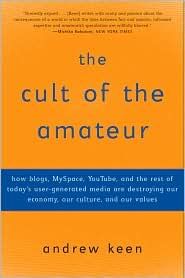
Publisher's overview on Barnes & Noble of "Cult of the Amateur" by Andrew Keen:
"Amateur hour has arrived, and the audience is running the show.
In a hard-hitting and provocative polemic, Silicon Valley insider and pundit Andrew Keen exposes the grave consequences of today’s new participatory Web 2.0 and reveals how it threatens our values, economy, and ultimately the very innovation and creativity that forms the fabric of American achievement.
Our most valued cultural institutions, Keen warns—our professional newspapers, magazines, music, and movies—are being overtaken by an avalanche of amateur, user-generated free content. Advertising revenue is being siphoned off by free classified ads on sites like Craigslist; television networks are under attack from free user-generated programming on YouTube and the like; file-sharing and digital piracy have devastated the multibillion-dollar music business and threaten to undermine our movie industry. Worse, Keen claims, our “cut-and-paste” online culture—in which intellectual property is freely swapped, downloaded, remashed, and aggregated—threatens over 200 years of copyright protection and intellectual property rights, robbing artists, authors, journalists, musicians, editors, and producers of the fruits of their creative labors.
In today’s self-broadcasting culture, where amateurism is celebrated and anyone with an opinion, however ill-informed, can publish a blog, post a video on YouTube, or change an entry on Wikipedia, the distinction between trained expert and uninformed amateur becomes dangerously blurred. When anonymous bloggers and videographers, unconstrained by professional standards or editorial filters, can alter the public debate and manipulate public opinion, truth becomes a commodity to be bought, sold, packaged, and reinvented.
The very anonymity that the Web 2.0 offers calls into question the reliability of the information we receive and creates an environment in which sexual predators and identity thieves can roam free. While no Luddite—Keen pioneered several Internet startups himself—he urges us to consider the consequences of blindly supporting a culture that endorses plagiarism and piracy and that fundamentally weakens traditional media and creative institutions.
Offering concrete solutions on how we can reign in the free-wheeling, narcissistic atmosphere that pervades the Web, THE CULT OF THE AMATEUR is a wake-up call to each and every one of us."
From Barnes & Noble:
"On his blog, Andrew Keen described The Cult of the Amateur as a short, sharp murder story in which all of us are the victims. A longtime Silicon Valley insider and participant, he grew disillusioned with the Internet renaissance that he had once touted. "What the Web 2.0 revolution is really delivering," he writes, "is superficial observations of the world around us rather than deep analysis, shrill opinion rather than considered judgment." In The Cult of the Amateur, he describes how digital Darwinism is decimating the ranks of cultural gatekeepers, journalists, editors, creators, and other specialists and replacing them with the loudest and the most opinionated bloggers. In addition to its impassioned critique of phenomena such as MySpace, YouTube, and Wikipedia, Keen's book contains important insights about business, political, and social trends."
Wikipedia entry says:
"Andrew Keen (born circa 1960) is a British-American entrepreneur and author. He is particularly known for his view that the Internet and Web 2.0 may be debasing culture, an opinion he shares with Jaron Lanier and Nicholas G. Carr among others. Keen is especially concerned that the Internet undermines the authority of learned experts.
In 2006 in an essay in The Weekly Standard, Keen wrote that Web 2.0 is a "grand utopian movement" similar to "communist society" as described by Karl Marx. He stated it "worships the creative amateur: the self-taught filmmaker, the dorm-room musician, the unpublished writer. It suggests that everyone – even the most poorly educated and inarticulate amongst us – can and should use digital media to express and realize themselves. Web 2.0 'empowers' our creativity, it 'democratizes' media, it 'levels the playing field' between experts and amateurs. The enemy of Web 2.0 is 'elitist' traditional media." He describes Free Culture proponent Lawrence Lessig as an "intellectual property communist".
His book The Cult of the Amateur, was based on this essay. The book is critical of free, user-based Web sites such as Wikipedia that attempt to provide information, and was published on June 5, 2007, by Doubleday Currency. In a BBC World Service documentary on Wikipedia in 2011, Keen recommends vigilance when reading Wikipedia."
Is our internet culture a threat to our society and economy?
Links:
http://www.barnesandnoble.com/w/the-cult-of-the-amateur-andrew-keen/1012778989
http://andrewkeen.typepad.com/
http://en.wikipedia.org/wiki/Andrew_Keen
http://en.wikipedia.org/wiki/The_Cult_of_the_Amateur
http://www.nytimes.com/2007/06/29/books/29book.html
http://www.guardian.co.uk/technology/2007/jul/20/computingandthenet.books
Links:
http://www.barnesandnoble.com/w/the-cult-of-the-amateur-andrew-keen/1012778989
http://andrewkeen.typepad.com/
http://en.wikipedia.org/wiki/Andrew_Keen
http://en.wikipedia.org/wiki/The_Cult_of_the_Amateur
http://www.nytimes.com/2007/06/29/books/29book.html
http://www.guardian.co.uk/technology/2007/jul/20/computingandthenet.books
Academics have been doing this sort of thing forever, mashing up everyone else's thoughts, opinions and findings.
ReplyDeletePep (The only difference is that they usually state their sources formally as references.)
PS except when they plagiarise, and exploit their grad students' work
Thought this might be the best place to post this.
ReplyDeleteFor Lee and other Culture Geeks.
http://www.mcluhan100.ca/
http://marshallmcluhan.com/
"You mean my whole fallacy's wrong?"